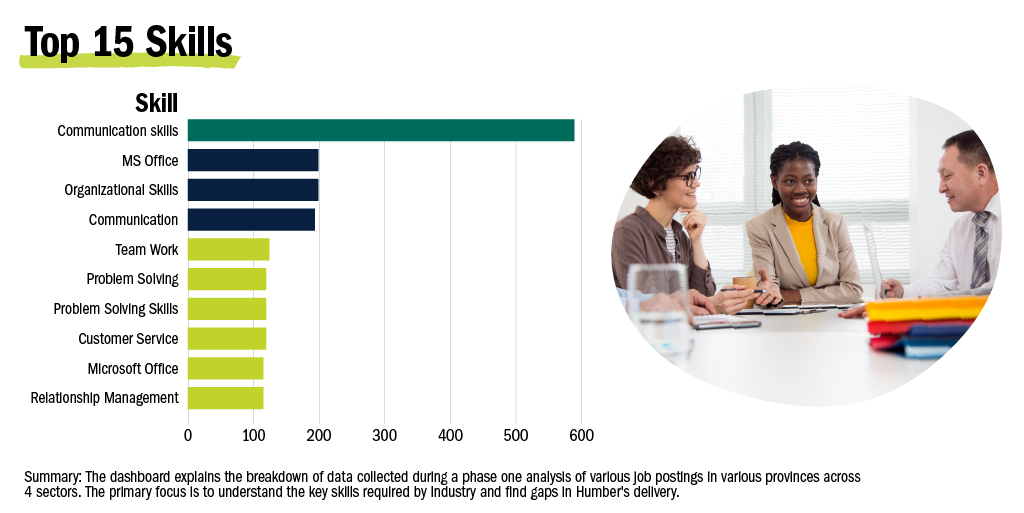A Skills-Mapping Analysis identifies Soft Skills are the most in-demand!
“It is not the strongest or most intelligent who will survive but those who can best manage change.” – Charles Darwin
Why Change?
Last year, The Washington Post asked readers to describe 2020 in one word or phrase. Here’s what they said: Exhausting, Lost, Chaotic, Surreal, Relentless.
How can we turn this around, not just survive but thrive in a post-pandemic era marked by shock and disruption? These words sum it up: Change, Research and Innovation.
According to the United Nations Department of Economic and Social Affairs, the equivalent of 255 million full-time jobs have been lost due to the pandemic, and 1.6 billion informal economy workers lacking a social safety net have been significantly affected. The recovery will be slow; global economic growth is expected to return to pre-pandemic levels only by 2022 or 2023.
The need to upskill and reskill is recognized widely, and academic institutions, including Humber College, are rethinking their education models to prepare learners to succeed in an ever-changing environment. How can our students lead, transform and differentiate (Humber’s Strategic Plan 2018-2023) in the age of innovation? Being a career-ready citizen means having the knowledge and skills to succeed in today’s workplace. But what are these skills? Is Humber effectively addressing the perceived skills gaps and developing the skill sets and competencies through academic programming, experiential learning opportunities and participation in research? Where can we improve? This is the question of the hour!
“The secret to change is to focus all of your energy not on fighting the old but on building the new.” – Socrates

The Good News
The good news is that SOFT SKILLS are by far the most required and the most demanded skills in the job market.
“To shed light on today’s most in-demand skills among Canadian professionals, LinkedIn partnered with the Labour Market Information Council to analyze 400,000 Canadian jobs posted in 10 major cities across Canada. Contrary to common belief, the findings revealed that soft skills such as business management, leadership, and oral communication are the most coveted among employers” – Jonathan Lister, VP Global Sales Solutions & Canada Country Manager at LinkedIn (Globe and Mail, November 2019)
The pandemic has normalized a hybrid workplace. Even before the pandemic, the Internet of Things (IoT), Artificial Intelligence (AI) and Blockchain technologies propelled an ongoing discussion on skills transformation. Today, there’s a new shift happening in our digital and service-focused economy: rapid skills transformation. The job market is changing so rapidly that the skills needed to perform these jobs transform every few years, intensifying pressure on workers to learn continually and, in some cases, transition entirely into new and emerging fields. Skills transformation is now the rule, not the exception, and in order for rapid technical skills transformation to occur, soft skills must be prioritized.
“As workers interact with ever-smarter machines, the demand for soft skills is beginning to surge. Social, emotional, and technological skills are becoming more crucial as intelligent machines take over more physical, repetitive, and basic cognitive tasks.” – McKinsey & Co.
How is Humber addressing this? As an academic institution committed to delivering globally recognized polytechnic education, the College developed its Humber Learning Outcomes (HLO) framework. Informed by international skills frameworks and dozens of consultations with industry partners, staff, faculty and students, the HLO framework articulates the soft skills and mindsets required to lead in an ever-evolving workplace. The HLOs are being integrated into every Humber program to ensure that every student is deeply engaged in their own learning and developing themselves as career-ready citizens.
“Education is for improving the lives of others and for leaving your community and world better than you found it.” – Marian Wright Edelman
ORI Research Team embarks on a “Skills Mapping Analysis”
At Humber’s Office of Research & Innovation (ORI), we embody the mindset we aim to cultivate across the Humber research community: to make research and innovation accessible and approachable to everyone. Inspired by this, and by the current focus on “skills transformation” and “skills development,” a research team at ORI, conducted a preliminary skills mapping analysis by comparing skills needed by industry with skills offered by Humber programs.
“Measuring Essential Skills of Postsecondary Students: Final Report of the Essential Adult Skills Initiative” by the Higher Education Quality Council of Ontario (HEQCO), states that, “The most-cited skills needed for job success are, at a cognitive level, an adequate level of literacy and numeracy, problem-solving and critical thinking; and at a behavioural level, effective communication skills, resourcefulness and adaptability.”
An enquiry-based and research mindset can uncover communication gaps and identify which skills and competencies need to be further incorporated into program outcomes and course outlines. Yes, knowing how to develop a project plan may be essential for a project management graduate, but what are the underlying soft skills that are transferrable and adaptable to emerging needs in the project management field—and beyond? This work intersects with that of the HLO framework, which helps programs to identify these skills, recognize how they are taught, and redefine how programs are meeting industry needs.
In 2013, at Google, Project Oxygen shocked everyone by concluding that STEM expertise comes in dead last among the eight most important qualities of Google’s top employees. The seven top characteristics of success at Google are all soft skills: being a good coach; communicating and listening well; possessing insights into others (including others different values and points of view); having empathy toward and being supportive of one’s colleagues; being a good critical thinker and problem solver and being able to make connections across complex ideas.
Research Team
How did the team develop their research idea? Here is what they have to say.
Barath Roy Michel, Senior Project Manager & Research Team Lead: “One of the problems faced by industry when it comes to hiring is finding the right skills, which made me pause and pose a question: Does certification mean that one has the competencies to perform a certain skill? To get there, we need to identify the skills demanded by the industry and the skills developed by Humber College. We have a diverse talent pool at ORI. We foster a culture of ‘anyone can be a researcher’. So, we decided to build our own research project at ORI.”
Manivannan Kannan, Project Coordinator: “We had no idea where this research would lead us; we went with the approach of ‘let’s build a car together’, we were able to collaborate and brainstorm and put the pieces together.”
Aarthi Rajam Subramanian and Piyusha Lokre, Project Coordinators: “From not knowing what we were doing, to embracing a research mindset–I have learnt that research is done in collaboration.”
Gianfranco Molfino Alvarado, Project Coordinator: “It was Michel’s idea to conduct a skills mapping analysis. We had some interesting observations and learnt a lot along the way.”
Here is what they did
“The art of communication is the language of leadership.” – James Humes

The research team found that communication skills and organization skills are two of the three top required skills, followed by teamwork and problem solving—soft skills remain the top in-demand skills
The goal of this project was to compare the skills required in the job market with skills developed at Humber. To keep the results manageable, the team searched for job postings focused on four sectors—Construction, Banking, Telecommunications, and Logistics—and five job categories—Administration, IT, Management, Marketing, and Operations and Sales. After identifying the programs at Humber that funnel into those sectors, they reviewed program descriptions, outcomes and course titles to identify skills explicitly developed.
This project focused on a Canada-wide job market, with job postings pulled from career websites such as LinkedIn, Indeed, and Monster. Skills identified were pulled from these job postings, which were further categorized into specific skills required for entry-level, mid-level and senior-level positions.
According to the Monster’s Future of Work: 2021 Outlook survey, recruiters chose soft skills—topped by dependability, teamwork/ collaboration, and problem-solving/critical thinking—as the most essential skills they’re seeking in new hires.
According to Indeed, soft skills help to build relationships and best use hard skills solve problems. Therefore, listing soft skills on your resume, demonstrating them in an interview and developing them in the workplace can support your career and open you to new opportunities.
The skills-mapping research team is currently documenting their observations to share and disseminate their findings. In the meantime, here are some facts:
- The team followed 3 research methodologies: Quantitative Research, Exploratory Research (How, Where and When), and Analytical Research (please refer to Definitions below).
- 1257 Jobs were analyzed
- 9258 Overall skills analyzed
- The top 15 skills most in demand were mapped against skills developed at Humber
Communication, Organizational Skills, Problem Solving, and Relationship Management are just a few of the skills most frequently identified in the job postings and are clearly identified in the HLO framework. Other HLO core skills align with the top skills from the analysis, as well. For example, the Digital Fluency HLO encompasses a range of skills from basic literacy in software to critical analysis of digital resources, and Microsoft Office appears in the skills analysis as a top desirable skill. The skills mapping analysis, therefore, supports the work of the HLO initiative by confirming the soft skills most desired by industry.
Skills Mapping Analysis – Research Recommendations

How did the identified programs match with the job postings? The data analysis showed a 51.24% match of identified in Humber programs with the cumulative top skills (technical and soft skills) needed in the industry. For a polytechnic institute, Humber expectedly matches technical skills required in the job market by a high degree. However, there appears to be a mismatch in soft skills, at least explicitly. Recognizing that program descriptions and outcomes do not offer a holistic picture of what is taught and learned in the classroom, this analysis can nevertheless be used to ensure programs are meeting industry needs and are communicating to potential students the relevant soft skills they will develop in their desired program. This analysis can also be upscaled to cover a greater number of industries that will provide further insights into the Canadian job market.
According to the Society for Human Resource Management (SHRM) 2019 Skills Gap report, 75% of those having difficulty recruiting believe there is a skills shortage among their applicants: top 3 missing soft skills are problem-solving, critical thinking, innovation & creativity, followed by the ability to deal with complexity and ambiguity as well as communication; whereas, the top three missing technical skills are trade skills, data analysis/data science and science/engineering/medical.
The research team lead, Barath Roy Michel, points out some recommendations to be considered:
- Identify potential misalignment/gaps in instruction to inform curriculum development, to better meet industry needs by bringing more faculty into the discussions with Program Advisory Committees (PACs).
- Build workshops/coaching sessions to communicate changes in industry requirements that might inform courses or changes in delivery methods.
- Create a learning loop of consistent assessments on what skills are getting updated or needed in the job market and disseminate this information regularly to facilitate dialogue and discussions.
A priority is to improve the ways in which academic programs incorporate soft skills into curriculum and communicate this skills acquisition. The HLO initiative is currently helping faculty identify, teach and assess critical skill development, prioritizing the same skills as found in ORI’s skills analysis. Once this process is in place, a pre-post analysis of the research done by ORI could provide insights into its effectiveness.
This skills mapping analysis presents a tangible way that ORI can support strategic initiatives across the college. Both ORI and the HLO initiative support Humber’s 2018-2023 Strategic Plan, aiding in the delivery of Pillar #1: Career-Ready Citizens. We achieve this by fostering a culture of research and innovation and encouraging an environment of creativity, critical thinking and problem solving.
The research team reiterated that this study was attempted and conducted out of curiosity with just the beginnings of an idea. What are you curious about? Is there a spark of an idea that you would like to discuss for a possible research study of your own? Get in touch with us and let us assist you in joining us on a path of research and innovation. Reach out to us at: researchprojects@humber.ca.
The research team wishes to thank Milan Patel, Data Visualization Specialist at ORI. He created the software code (for the above analysis) over Python to enable the team to reference any jobs database against Humber’s skills to generate an updated match instantly.

“Soft Skills” are the “Essential Skills for Success”
Skills development has become an essential component to meet the demands of the future. Improving the employability of workers, creating sustainable job opportunities that lead to healthier economies and healthier communities, and preparing our future leaders to compete and advance in an innovative era requires that we continue the work of skills mapping, skills matching and skills upgrading. At Humber, we’re taking the steps to ensure that graduates exceed the needs of industry, and skills insights like described here are crucial to ensure we are offering the education that our economies need.
“Our collective responsibility is to uphold our core values — courage, innovation, equity, health & well-being, and sustainability — while ensuring that all graduates possess the core competencies essential for success in the workforce and in life.” – Humber College
Definitions
Quantitative Research: A research strategy that focuses on quantifying the collection and analysis of data. The objective of quantitative research is to develop and employ mathematical models, theories, and hypotheses pertaining to phenomena.
Exploratory Research: Exploratory research intends merely to explore the research questions and does not intend to offer final and conclusive solutions to existing problems. This type of research is usually conducted to study a problem that has not been clearly defined yet.
Analytical Research: The analytical research usually concerns itself with cause-effect relationships and attempts to establish why it is that way or how it came to be.
References
Analytical Research. (n.d.). California State University, Sacramento. https://www.csus.edu/indiv/y/yangy/145ch1.htm
Corporate Canada is facing a soft-skills deficit – what can we do about it? (n.d.). The Globe and Mail. https://www.theglobeandmail.com/business/careers/leadership/article-corporate-canada-is-facing-a-soft-skills-deficit-what-can-we-do/
Exploratory research. (n.d.). Research-Methodology. https://research-methodology.net/research-methodology/research-design/exploratory-research/
Forbes. (n.d.). https://www.forbes.com/sites/anantagarwal/2018/08/29/how-is-the-skills-transformation-impacting-modern-work/?sh=3727a6b225ff
Higher Education Quality Council of Ontario. (n.d.). https://heqco.ca/wp-content/uploads/2020/02/FIXED_English_Formatted_EASI-Final-Report2.pdf
HLO framework. (n.d.). Office of the Senior Vice President Academic. https://humber.ca/svpa/ilos/hlo-framework/
Humber 2018-2023 strategic plan. (n.d.). https://humber.ca/strategic-plan/
Indeed Editorial Team. (n.d.). 10 reasons why soft skills are important to employers. https://www.indeed.com/career-advice/interviewing/why-are-soft-skills-important
Quantitative research. (n.d.). Wikipedia. https://en.wikipedia.org/wiki/Quantitative_research
Research, A., & Innovation. (n.d.). Office of research and innovation at Humber college. https://www.humber.ca/research/migrating-from-stem-to-steams/?_ga=2.11253047.229915157.1629726669-215810917.1627994276
SDG | Department of Economic and Social Affairs. (n.d.). Sustainable Development. https://sdgs.un.org/goals/goal8
The skills gap 2019. (n.d.). SHRM. https://www.shrm.org/hr-today/trends-and-forecasting/research-and-surveys/Pages/Skills-Gap-2019.aspx
Soft skills to help your career hit the big time. (n.d.). Monster Career Advice. https://www.monster.com/career-advice/article/soft-skills-you-need
The Washington Post. (n.d.). https://www.washingtonpost.com/news/answer-sheet/wp/2017/12/20/the-surprising-thing-google-learned-about-its-employees-and-what-it-means-for-todays-students/
The Washington Post. (n.d.). https://www.washingtonpost.com/graphics/2020/lifestyle/2020-in-one-word/
